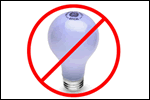- Electricity
- Posted
Dept of Environment plan to phase out light bulbs delayed

THE PHASING out of incandescent light bulbs has been delayed until
September following the Department of Environment’s decision to drop
domestic legislation to begin banning them from June.
Minister for the Environment John Gormley yesterday said he will not proceed with his own legislation to eliminate the light bulbs because the European Union has accelerated its own plans to ban them.
The gradual ban of incandescent bulbs was due to start in Ireland from next June under a new law that was to be published early this year.
However, Mr Gormley announced that the Irish proposals will now be dropped in light of more ambitious EU proposals.
Last month, the EU commission published plans to phase out incandescent bulbs starting in September – three months later than the Irish plan – and ending in 2012. While the move has already received preliminary approval from member states, it will face a number of hurdles, including scrutiny by the European Parliament. But if the parliament gives its approval to the proposals, they will be formally adopted by the commission in March.
However, the Labour Party claimed that Mr Gormley has backed down on his proposals. Party environment spokeswoman Joanne Tuffy said that the Irish ban was never feasible without EU backing. She said that all Mr Gormley had done was draw attention on what the EU intended to introduce in any case.
“Minister Gormley is now attempting to argue that he only made his latest decision as a result of the EU Commission changing their plans radically to keep pace with his own proposals,” she said
“What is more likely is that he changed tack when he realised that, as I previously pointed out, his scheme could well fall foul of internal market regulations and that he would be either bogged down in EU process and procedure, or forced to cancel his scheme after it had been rolled out,” said Ms Tuffy.
For his part, Mr Gormley conceded that the EU initiative would be three months later than the one envisaged for Ireland. However, he pointed out that its overall scope was wider than had been expected.
“It is, in my view, a very positive step for the EU and I’m satisfied that, if adopted and implemented as proposed, it obviates the need for any national measures,” he said.
Commission vice-president Günter Verheugen said that Ireland had taken a leadership role on the issue of light bulbs.
“The Irish plans prompted the commission to pursue a much more ambitious EU-wide approach for the phasing out of energy inefficient lighting,” he said.
Greenpeace also welcomed the announcement, saying that the Irish Government had stood up to the commission to avoid weak legislation.
“Initiatives like the Irish legislative proposal, show how important it is that member states take leadership,” said its representative Sharon Becker.
“The good news is that the sale of old fashioned bulbs will be banned between 2009 and 2012. The bad news is that halogens will not be taken off the market until 2016, which is far too late for serious climate action,” added Ms Becker.
(c) The Irish Times

